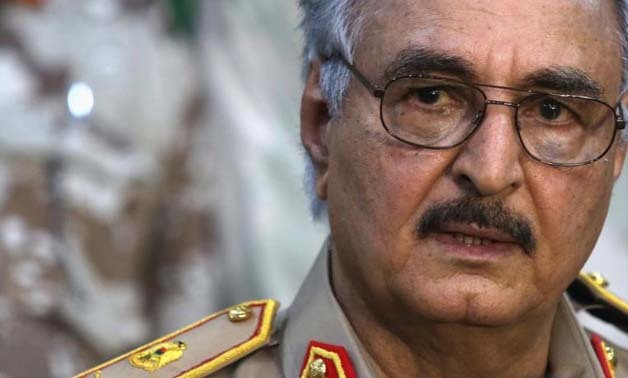
Libya's army commander Khalifa Haftar
CAIRO – 3 May 2017: The head of the U.N.-backed Libyan Government of National Accord, Fayez al-Sarraj, met Monday with Khalifa Haftar, commander of the eastern “Operation Dignity” forces, in Abu Dhabi in an attempt to reach a consensual agreement.
According to a local Libyan TV channel, the Abu Dhabi meeting reached an initial agreement to form a unified presidential council where of the commander of the army and the heads of both the Libyan government and the House of Representatives would be members. The two sides also agreed to form an unified Libyan army and dissolve all militant groups.
Moreover, parliamentary elections will be held six months after the agreement comes into force.
This is the second meeting between the two major sides in Libya. They first convened in January 2016 after Sarraj was selected to lead the only internationally recognized Libyan government, located in Tripoli. The meeting was held under the auspices of the Crown Prince of Abu Dhabi, Mohammed bin Zayed al-Nahyan.
Field Marshal Haftar controls the eastern side of Libya and works in cooperation with the government of the House of Representatives, known as the "Tobruk government." It was democratically elected in 2014 and is recognized internationally.
Sarraj and Haftar were supposed to meet in Cairo in mid-February after Egyptian President Abdel Fatah al-Sisi launched an initiative to negotiate amendments to Libya's U.N.-backed deal, under which the Government of National Accord was formed.
Since taking office in Tripoli in March 2016, the Accord Government has not been able to extend its authority over the entire country.
The peace agreement, signed in December 2015, did not determine the role of Haftar, whose troops currently control much of eastern Libya and the main oil terminals of Es Sider and Ras Lanuf, so the question about how it will be implemented remains.
Libya has been locked in conflict since the revolt which overthrew long-time leader Muammar Gaddafi four years ago.
The civil war has witnessed the emergence of numerous armed groups, forcing several countries to evacuate their expatriates and diplomats.
According to a report issued by the U.N. Support Mission in Libya, 26 people were killed and two others injured in operations in all Libyan cities in April alone. Among the victims were 23 civilians, including a woman and two children.
Comments
Leave a Comment